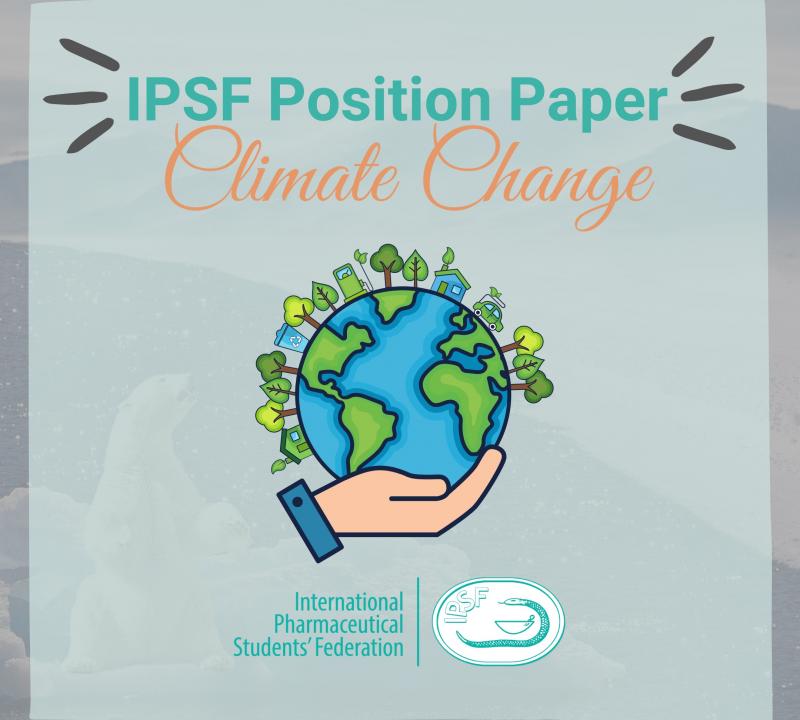
IPSF Position Paper on Climate Change
Background
“Taken as a whole, the range of published evidence indicates that the net damage costs of climate change are likely to be significant and to increase over time.” - Intergovernmental Panel on Climate Change.
“The average global temperature has risen by about 1.1°C since the pre-industrial era and ocean heat content is at a record level,” - Petteri Taalas, World Meteorological Organization’s Secretary-General.
“This puts a big emphasis on the need to make sure that we curb greenhouse gas emissions” - Ricardo Mena, UN Office for Disaster Risk Reduction’s Chief.
Climate change is a global challenge that is impacting the environment in general and health in particular. Its impact is growing at an ever-increasing pace, making it harder to dismiss or to overlook it as part of the factors affecting the healthcare setting, altering physical health, mental health, and social well-being. In addition, climate change is resulting in an increase in the frequency and intensity of extreme weather events as well as modifying the transmission of different kinds of infectious diseases.
The greatest risks resulting from climate change are being borne by the vulnerable, including populations resident on small islands, the Arctic, water-stressed, and low-lying areas, as well as those in low-income countries and regions. Extreme weather events, temperature elevation, and reduced air quality, amongst others, are disrupting lives and the economy while also increasing chronic health conditions like asthma, or magnifying the range of infections, and aggravating mental illness. In 2018, the UN Intergovernmental Panel on Climate Change estimated that to avoid catastrophic eventualities of our climate, we need to curb our greenhouse gas emissions in half by 2030 and reach zero emissions by 2050.
Climate change strikes at the core of health systems financially and structurally, for example when Hurricane Maria hit Puerto Rico in 2017. The storm killed people and disrupted supply chains. Consequently, across the United States of America, patients faced shortages of intravenous fluids because Puerto Rico manufactures IV bags, and the plants were damaged in the storm. For months, hospitals had to resort to slowly injecting medications by syringe. Needless to mention, healthcare systems and workforce are on the front lines of climate change. However, the response from local and national government bodies to the threats presented by climate change, is not up to standard.
Temperature-related health problems, mental health, air quality impact, natural disasters, water-related illness, food safety, amongst others, are making many stakeholders emphasize on actions:
- Countries like Pakistan and the USA are planting trees and preserving forests, and as a result, today there are more trees in the USA than a decade ago.
- Others like the UK and Rwanda are putting their foot down on plastic pollution by introducing more environmental and climate-friendly alternatives to traditional plastic bag carriers.
- International governmental and non-governmental organisations, businesses, and corporations are also chipping in, taking initiatives, introducing policies, and implementing systems that align their statement with the fight against climate change. (e.g. As of 2018, the World Bank took a stance against the fossil fuel industry; the international monetary organisation will no longer fund oil and gas exploration).
Additionally, pharmaceutical waste continues to be a huge problem. Pharmaceuticals discarded in the environment have been shown to pose a risk to fish and other wildlife, for example by affecting their ability to reproduce, by altering their behaviour in ways that jeopardise their survival, or through direct toxic effects. Incorrectly disposed medicines may also contribute to the serious problem of antimicrobial resistance. Increased awareness has prompted further investigation, as well as calls and proposals for action to reduce emissions to the environment, in particular to water but also to soil.
IPSF Contributions
Founded in 1949, the International Pharmaceutical Students’ Federation (IPSF) is the leading international advocacy organisation for pharmacy students with the aim to promote improved public health through the provision of information, education, and networking opportunities as well as a range of publications and professional initiatives. IPSF currently represents the voice of over 500,000 pharmacy and pharmaceutical sciences students and recent graduates in 92 countries worldwide. Regarding Climate Change, IPSF and its members have engaged in several activities and advocacy campaigns including at the World Health Assembly (WHA). IPSF delivered a statement at the 72nd WHA on “Health, Environment and Climate Change” calling on the WHO and the Member States “to strengthen the monitoring of air pollution, implementation of targeted policies, raise awareness and guarantee the protection of our vulnerable groups”. IPSF acknowledged the direct attribution of human activity to climate change and therefore stressed the call for an “action that brings collaboration and combined advocacy efforts, that target the general public”. Furthermore, IPSF has engaged in an NGO Consultation with the Alliance for Health Promotion (A4HP) in February 2020 and discussed with the WHO Climate Change & Health Advisor the potential to work together to bring the input of the youth into their working group. IPSF is also continuously working to implement climate action objectives within the Federation and in our activities. The Chairperson of Public Health recently attended and spoke in various climate action webinars emphasising the importance of youth in making positive changes to impact the environment and also highlighted the impact of pharmaceuticals in the water supply.
Call To Action
Moving forward, IPSF intends to make our facilities, operations, campaigns, and events eco-friendly and reduce our carbon footprint by the next decade 2020 - 2029, as a milestone goal paired with our 80th anniversary by 2029.
In recognition of our mission, values, and commitment to pharmacy and public health, and in rising up to the climate change challenge, IPSF:
- Acknowledges that 25% of worldwide deaths and disease burden are from avoidable environmental risks;
- Recognizes that all stakeholders need to continue to rethink their collective lifestyle choices, including the way they consume and govern, in order to address health, environment and climate change challenges;
- Commends healthcare institutions, and other stakeholders’ changes in consumption, selection of materials and resources in their daily operations, to avoid being part of the problem in any way:
- Switching to renewable energy,
- Upgrading to an environment-friendly technology (e.g. lightbulbs from fluorescent lights to lower-energy LEDs),
- Setting new standards and decreasing their carbon footprint,
- Influencing their staff and audience to follow in their footsteps;
- Supports the stance of focusing interventions on upstream determinants of health and climate change in a manner that is integrated and mainstreamed across multiple sectors, using a public health framework backed by sufficient governance mechanisms and high-level political will;
- Calls upon all stakeholders, including communities, to be more active in creating the desired energy transitions, leading urbanization and mitigating the negative consequences of other significant development trends, for public health protection and promotion;
- Further calls upon all stakeholders to be actively engaged in the development of new evidence-based approaches that take into consideration the implications of actions in their entirety, including a more long-term and equitable perspective;
- Requests health ministries and medical facilities to reinforce, implement, and adopt Green Health, an environmentally responsible approach to healthcare;
- Further requests health ministries and health workforce stakeholders, after the strengthening of their capacity, to engage other government sectors through leadership, partnership and advocacy to attain improved health outcomes and avoid current or future economic costs related to treating climate-related diseases and their consequences;
- Urges WHO, the Member States and stakeholders to invest finances, personnel, and other resources in upgrading its preparedness and capability to face climate change, including extreme weather conditions and other butterfly effects;
- Recommends health leaders to disseminate relevant and up-to-date evidence regarding the link between climate change and health, and communicate threats and opportunities for climate change action in both national and international fora;
- Further recommends introducing Climate Change in health education, addressing not only how to catch up with eventual health threats, diseases, and shortages, but also how to reduce waste, and be environmentally responsible while diagnosing and treating, or managing healthcare operation.
- Condemns the absence of community outreach programs to educate and raise awareness amongst the healthcare workforce and the public about climate change;
- Commits to educating and disseminating knowledge, in order to empower its members and the public, while promoting policies to protect public health from negative climate change effects;
- Resolves to address the climate change gap within IPSF and in IPSF activities by ensuring that all IPSF activities are progressive, transformative, and environmentally-friendly.
To IPSF, to IPSF, Viva la Pharmacie!
References
- Green Health WMA
- WHO Climate Change
- Vital Signs of the Planet
- Health Care Climate Challenge
- The Effects of Climate Change
- Climate change positive stories
- Article on pharmaceutical pollution
- The Climate Emergency: how can pharmacy be more sustainable?
- How Health Systems Are Meeting the Challenge of Climate Change
- World Earth Day 2018: 11 reasons to feel positive about the environment
- Who turned up the temperature? Climate change, heat waves, and wildfires
- Disasters: UN report shows climate change causing ‘dramatic rise’ in economic losses
- The Impacts of Climate Change on Human Health in the United States: A Scientific Assessment
- Health, environment and climate change Draft plan of action on climate change and health in small island developing States Report by the Director-General
- Health, environment and climate change Draft WHO global strategy on health, environment, and climate change: the transformation needed to improve lives and well-being sustainably through healthy environments Report by the Director-General



